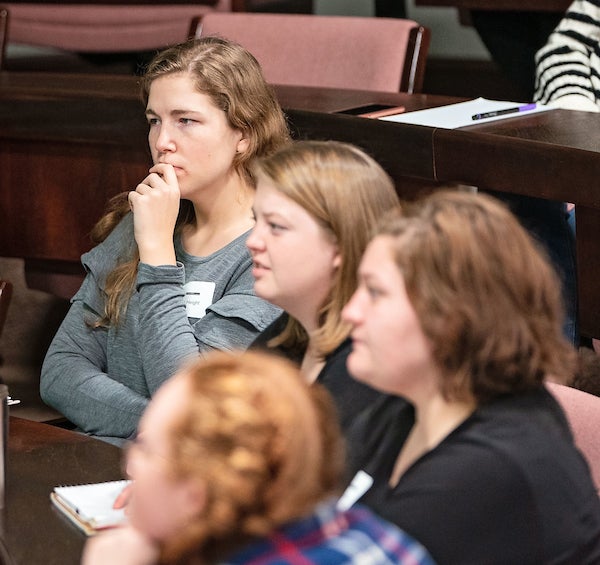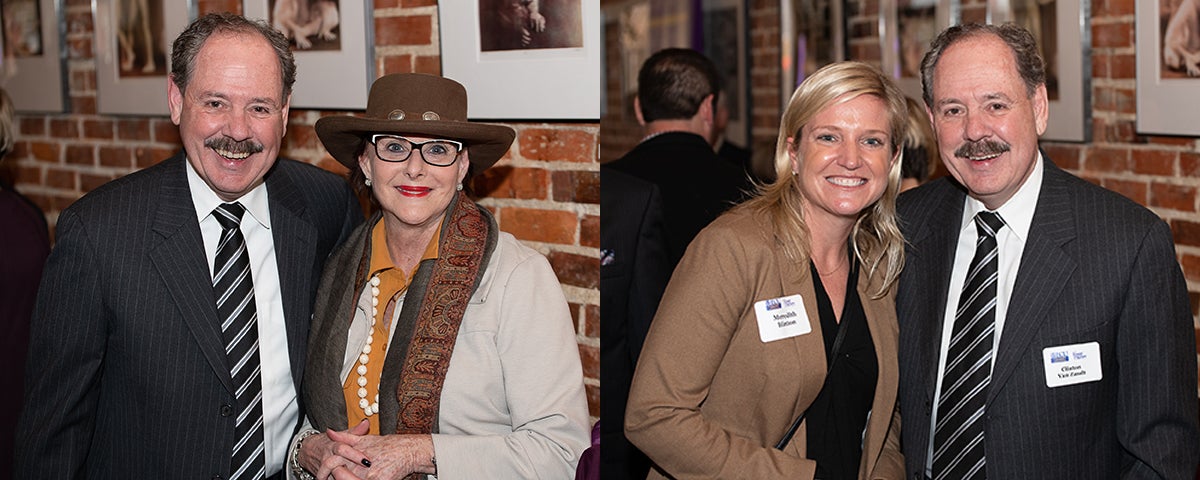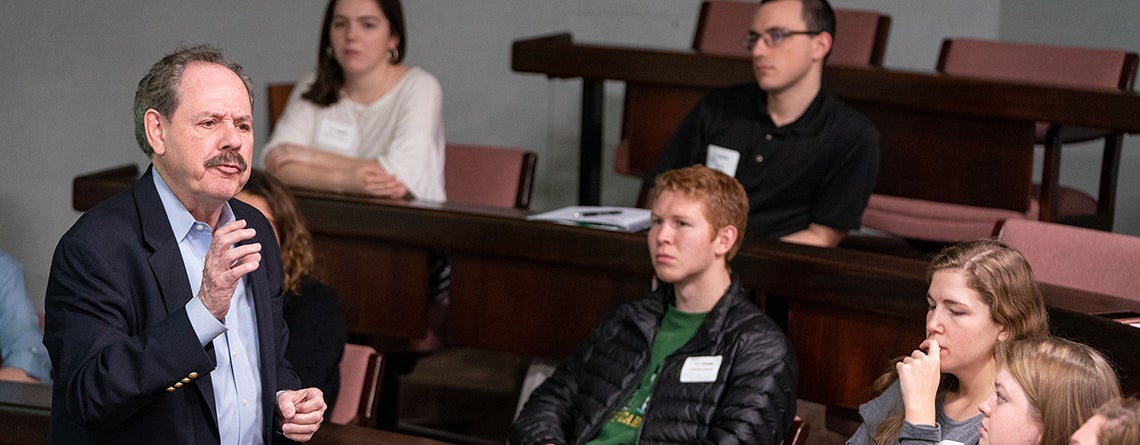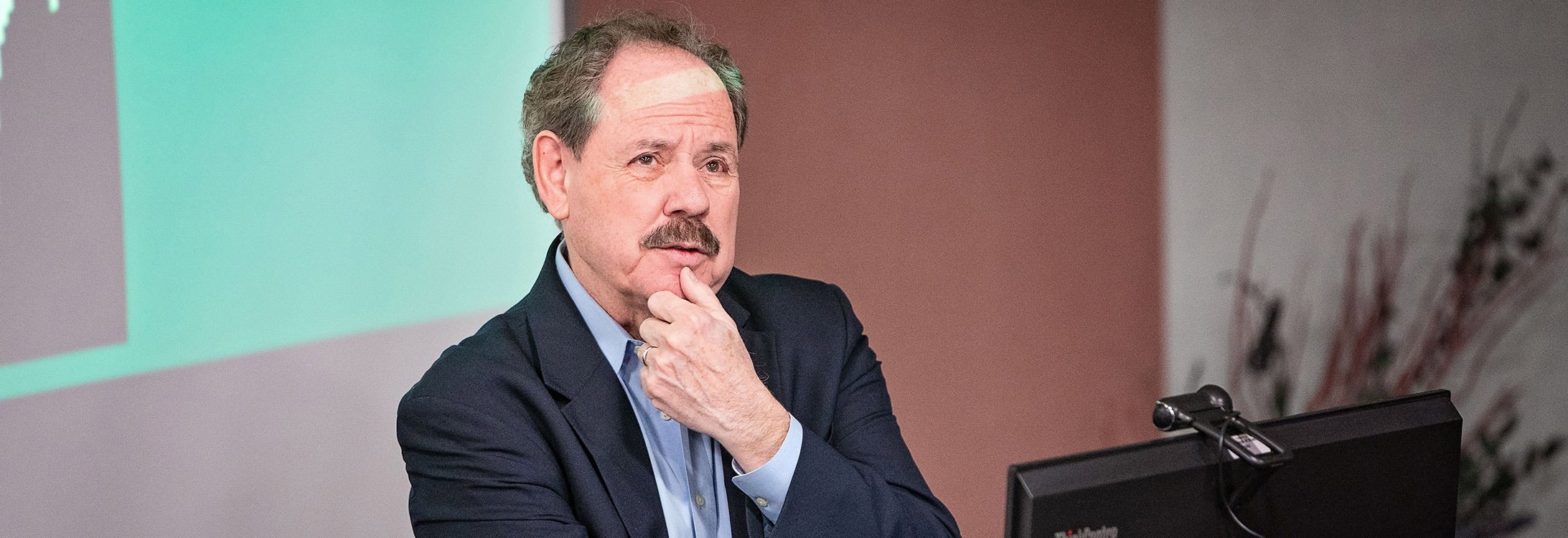UNDERSTANDING HUMAN BEHAVIOR
Retired FBI criminal profiler speaks at ECU Voyages of Discovery event

ECU students listen as Van Zandt discusses hostage negotiations and criminal profiling. (Photo by Cliff Hollis)
Clinton Van Zandt, retired FBI criminal profiler and hostage negotiator, was welcomed to East Carolina University and the Greenville community on Feb. 21 as the third presenter in the 2018-2019 Voyages of Discovery Series.
Earlier in the day, Van Zandt met with 30 ECU students in a classroom on campus, and then spoke to a large public audience in Wright Auditorium about the “History of Criminal Profiling: Understanding the Criminal Mind.”
While meeting with the students, Van Zandt said he always wanted to be an FBI agent.
“The only thing I ever wanted to be, since I was in grade school, was an FBI agent, and I got to do it,” Van Zandt said. “I was Peter Pan, and I got to fly. I got to do everything I wanted to do in the 25 years I was in the FBI.”
During that time, Van Zandt served as supervisor of the FBI’s internationally respected Behavioral Science or “Silence of the Lambs” Unit. He personally negotiated with Branch Davidian cult leader David Koresh in Waco, Texas, correctly profiled Oklahoma City Bomber Timothy McVeigh and led the analytical team that helped identify the Unabomber. He has conducted negotiations that brought about the release of hostages held by prison rioters, kidnap victims held by South American guerrillas and terrorists in the Philippines.
At ECU, Van Zandt provided valuable insights and information to help others better understand human behavior and the process of psychological profiling.
He touched on the case of actor Jussie Smollett and the four reasons someone may make themselves a victim: personal gain; mental illness; revenge or anger against somebody; and the need for an alibi.
According to Van Zandt, the FBI does a two-track investigation in cases.
“Track number one says, ‘I believe you are a victim. I 100 percent believe it, and I’m going to find these guys and lock them up,’” Van Zandt said. “Track number 2 says, ‘You’re kidding us. I’m not sure this sounds good at all, and I’m going to find out what really happened.’”
In today’s society, Van Zandt said it is much harder for perpetrators to get away with crimes because someone is always watching.
“It’s hard to do anything in this world today that someone is not photographing,” Van Zandt said to the students. “There are cameras everywhere. You cannot do something and not be seen.”
Van Zandt led his audiences through his career with the FBI as a hostage negotiator and the history and basics of criminal profiling.
“As a negotiator, you start a dialogue,” Van Zandt said.

Prior to the evening event, Van Zandt attended a reception at Starlight in downtown Greenville and met with friends of Harriot College, including Harvey Wooten (left) and Meredith Hinton (right). (Photos by Rob Taylor Photography & Design)
He said you get the person to relate to you and to “trust you” so that you can figure out what is going on with the person and what he or she really wants.
In one instance, Van Zandt negotiated with a bank robber who had taken hostages into surrendering for a plate of red beans and rice, and he coaxed a hijacker off an airline with a pack of cigarettes.
On the subject of criminal profiling, Van Zandt said, “Profiling is simply a tool the investigator carries in their back pocket. All profiling does is help you take 325 million Americans and shrink it down.”
He said you start to get a statistical view of who would likely perpetrate that crime, allowing the investigators to then look for the “type of person,” not necessarily a specific person.
During his evening presentation, Van Zandt discussed various criminal profiles. He reviewed the three types of murderers: mass murderers, who kill multiple individuals at one time, during one event; spree killers, who kill multiple people over a number of different events within a shorter time frame; and serial killers, whose difference includes a “cooling off” period of time before the killer feels the need to kill again. He also explained the differences between sociopaths and psychopaths; and between modus operandi – the method used to commit the crime, and a signature – an aspect of the crime that is unique to the perpetrator.
Van Zandt referred to a number of famous criminal cases and murders, including the 2012 shooting spree at the Aurora, Colorado, movie theater; the case of serial killer Ted Kaczynski, also known as the Unabomber; and the unsolved murder of six-year-old JonBenet Ramsey in her home on Dec. 25, 1996.
Van Zandt showed the audience a copy of the kidnapping/ransom letter left in the Ramsey’s home, and walked them through the process of breaking it down through a psychological perspective, creating an image of who may have written the letter.
Earlier, Van Zandt told students that his career has been fulfilling.
“If any of you consider law enforcement as a career, it can be very rewarding,” he said. “There are ghosts that come and visit you at night sometimes, but otherwise, you feel like you’ve made the world a better place.”
Before joining the FBI, Van Zandt was a U.S. Army counter-intelligence agent and a Vietnam War veteran. He regularly consults with companies across the U.S. and around the globe on programs related to crisis management and violence in the workplace.
The university’s final 2018-2019 Voyages of Discovery Series event will feature Dr. Lisa Randall, Harvard University physicist, who will speak about “Dark Matter and the Dinosaurs” at 7 p.m. on April 4, in Wright Auditorium. For additional information, visit www.ecu.edu/voyages.

Earlier in the day, Van Zandt met with a group of 30 ECU students in a classroom in Bate, where he discussed hostage negotiations, criminal profiling and the value of law enforcement. (Photo by Cliff Hollis)
